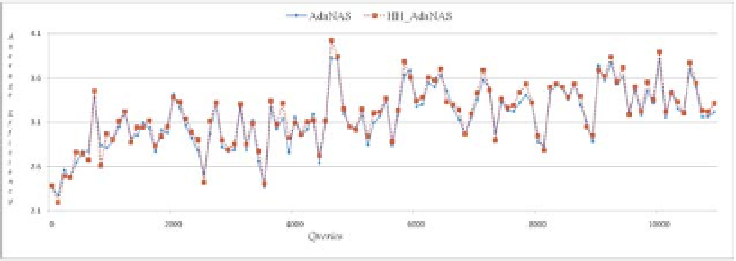Information Technology Reference
In-Depth Information
The Figure 11 shows the average efficiency performed during a set of queries with
HH_AdaNAS and AdaNAS algorithms; for the two algorithms the behavior is
approximately the same. The algorithm HH_AdaNAS at the beginning the efficiency is
around 2.38 hits per hop in the first 100 queries and the algorithm AdaNAS start
approximately at 2.37 hits per query also in the top 100 queries. Analyzing at another
example of the experiment, after processing the 11 000 queries at the end the efficiency
increases around 3.31 hits per hop for the algorithm HH_AdaNAS and the algorithm
AdaNAS at 3.21 hits per query. Finally, due to the result we conclude that HH_AdaNAS
achieves afinal improvementin performanceof 28.09%, while AdaNAS reachesan
improvement of 26.16%.
Fig. 11. The average efficiency performed during 11,000 queries with two algorithms.
6. Hybrid systems of metaheuristics: an approximate solution of ASP
The majority of problems related with ASP have a high level of complexity, according to
application domains. An alternative solution is the use of Hybrid Systems based on
Heuristics and Metaheuristics. Algorithm selection has attracted the attention of some
research in hybrid intelligent systems, for which many algorithms and large datasets are
available. Hybrid Intelligent Systems seek to take advantage of the synergy between various
intelligent techniques in solving real problems (Ludermir et al., 2011).
6.1 Relation of meta-learning and hybridization
Although some algorithms based on Hybrid Systems of Metaheuristics are better than
others on average, there is rarely a best algorithm for a given problem according to the
complexity and application domain related with the proposal solution. Instead, it is often
the case that different algorithms perform well on different problem instances. This
condition is most accentuated among algorithms for solving NP-Hard problems, because
runtimes of these algorithms are often highly variable from instance to instance.
When algorithms present high runtime variability, one is faced with the problem of
deciding which algorithm to use. Rice called this the “algorithm selection problem” (Rice,
1976). The algorithm selection has not received widespread attention. The most common
approach to algorithm selection has been to measure the performance of different
algorithms on a given instances set with certain distribution, and then select the algorithm
with the lowest average runtime.


